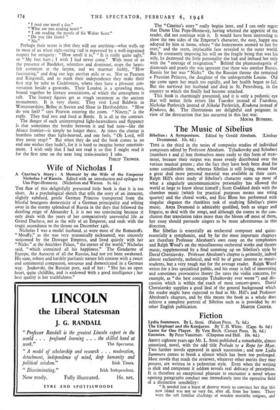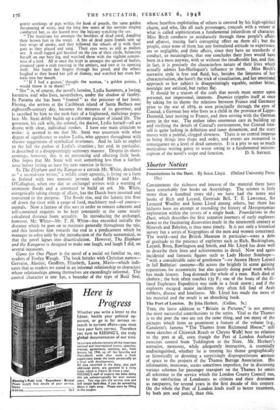Fiction
Lydia Summers. By L. Steni. (Falcon Press. 7s. 6d.)
Asotrr eighteen years ago Mr. L. Steni published a remarkable, almost unnoticed, novel, with the odd title Prelude to a Rope for Myer. Two further novels appeared in quick succession ; and now Lydia Summers comes to break a silence which has been too prolonged. Most novels that reach the reviewer, whatever other merits they may possess, are written in a pedestrian style. Even when the writing is slick and competent it seldom reveals real delicacy of perception. It is therefore an exceptional pleasure to encounter a novel whose opening paragraphs conduct one immediately into the operative field of a distinctive sensibility:
" It needed just a burst of drowsy music to convince her that this new island was not so very far, after all, from her home. There were the soft familiar cluckings of wooden marimba tongues, and
gentle seethings of pips within the husk of gourds, the same golden thrumming of wires, and the long low notes of the mestizo singing comforted her, as she leaned over the balcony watohing the sea. " The musicians lay amongst the boulders of dead coral, dangling their brown feet in the water. A fire of dead palm fronds sent up lazy wisps of smoke, and they followed the whorls of it with their gaze as they played and sang. Their eyes were as still as molten ore. A small ragged girl hovered on the rim of their circle, balancing herself on one bare leg, and watched them with the vigilant remote- ness of a bird. All at once she leapt in amongst the sprawl of bodies, pounced upon a crab roasting in the embers, and tore at its opening shell. She burnt her fingers through her greed, and the others laughed as they heard her yell of dismay, and watched her cram her nails into her mouth.
" If I had a guinea,' thought the woman, 'a golden guinea, I would throw it to them! '"
" She " is, of course, the novel's heroine, Lydia Summers, a loving, harmless soul who lives, nevertheless, under the shadow of fatality. In Panama she has been " framed " as the poisoner of her lover. Fleeing, she arrives at the Caribbean island of Santa Barbara one eighteenth-century day, becomes the mistress of its governor, and is sacrified by him to the mob fury of a frightened, malicious popu- lace. Mr. Steni deftly builds up a coherent picture of island life. The governor, his sick wife, the colonel, the doctor, Lydia herself—all are drawn with clear, individual strokes. I have one main criticism to make : it seemed to me that Mr. Steni was uncertain with what degree of significance to endow Lydia, who appears throughout with elusive suggestions of symbolical overtones. And he fails to exploit to the full the pathos of Lydia's situation ; her end, in particular, is described in a disappointingly summary manner. Despite its short- comings, however, this is an entrancing and affecting little book. One hopes that Mr. Steni will wait something less than a further aeon before letting us have his next exercise in fiction.
In The Elephant and the Kangaroo a certain Mr. White, described as "a second-rate writer," a mildly crazy agnostic, is living on a farm in Ireland with two moronic persons called Mikey and Mrs. O'Callaghan, when one day an archangel arrives with a warning of imminent floods and a command to build an ark. Mr. White, energetically taking charge of affairs, has the Dutch barn inverted and converted to the purpose. The floods rise, and the lunatic trio float off down the river with a cargo of food, machinery and—of course— animals. Now a fantasy of this sort in order to remain coherent and self-contained requires to be kept constantly at the same nicely calculated distance from actuality. In introducing the archangel, however, Mr. White—Mr. T. H. White—has exceeded initially the distance which he goes on to maintain generally throughout the tale, and this involves him towards the end in a predicament which he manages to solve only by the introduction of the flatly nonsensical, so that the novel lapses into disarticulation. However, The Elephant and the Kangaroo is designed to make one laugh, and laugh I did, on several occasions.
Game for One Player is the novel of a social set familiar to, say, readers of Evelyn Waugh. The book bristles with Christian names- Gervaise, Alastair, Geoffrey, Elizabeth, Laura, Mavis—which indi- cates that as readers we stand in an informal relationship to characters whose relationships among themselves are exceedingly informal. The central character is one Ian, a bounder of the type of Basil Seal whose heartless exploitation of others is covered by his high-spirited charm, and who, like all such personages, conceals with a veneer of what is called sophistication a fundamental infantilism of character. Miss Birch conducts us assiduously through these people's affairs and affaires, tracing Ian's corrupting effect on them all ; but the people, since none of them has any formulated attitude to experience, are so negligible, and their affairs, since they have no standards of conduct, so meaningless, that one concludes their lives would have been in a mess anyway, with or without the insufferable Ian, and that, in fact, it is precisely the characterless nature of their lives which actually admits Ian-Harlequin's influence to them. Miss Birch's narrative style is free and fluid, but, besides the limpness of her characterisation, she hasn't the trick of visualisation, and her emotional approach to her subject is disappointingly equable, neither bitter, nostalgic nor satirical, but rather flat.
It should be a truism of the craft that novels must centre upon personal, not impersonal, interests. Enemies cripples itself at once by taking for its theme the relations between France and Germany prior to the war of 187o, as seen principally through the eyes of Conrad, a German boy who lives as a child in, the province of Lippe- Detmold, later moving to France, and then serving with the German army in the war. The author takes- enormous care in building up and vivifying the details of Conrad's environment, but Conrad him- self is quite lacking in definition and inner dynamism, and the story moves with a painful, clogged slowness. There is no central impetus to bring things into shape and order, and events are recounted in consequence on a level of dead sameness. It is a pity to see so much meticulous writing going to waste owing to a fundamental miscon- ception of the novel's scope and function. D. S. SAVAGE.































 Previous page
Previous page